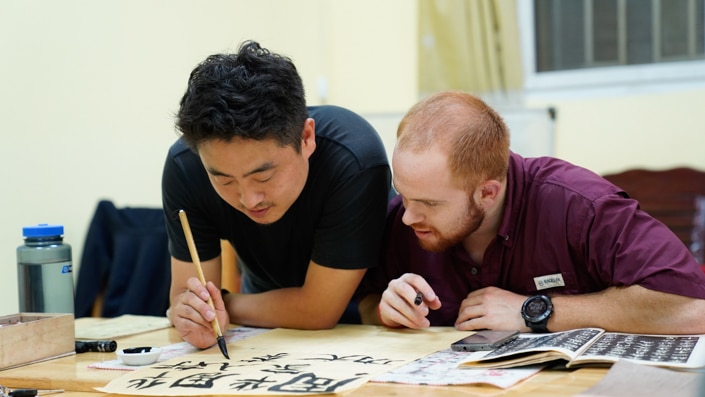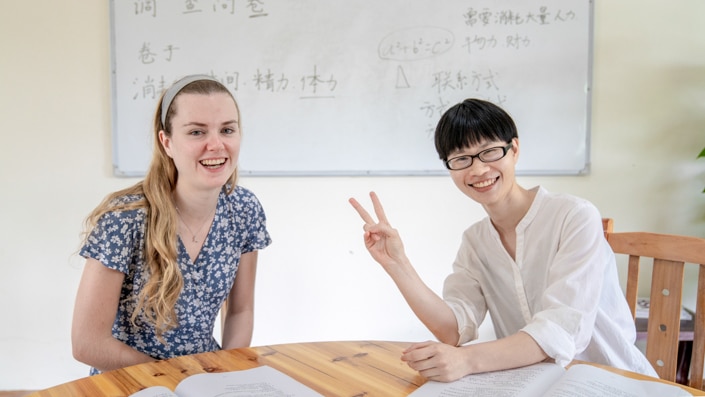How to Say Try Again in Cantonese
Learning to say "yep" is ordinarily one of the first things y'all learn when studying a new linguistic communication. Unfortunately, you might be surprised to learn that in Chinese, at that place's no straight equivalent to the English language "yeah." Fear not! We're here to walk you through some of the about common ways to say "yes" in Chinese. For example, 是 (🔈 shì)!

Table of Contents
- No Directly Translation
- 10 Mutual Ways to Say "Yes" in Chinese
- i. 是 | shì | to be; yes
- 2. 对 | duì | right
- 3. 没错 | méicuò | not incorrect
- four. 好 | hǎo | good
- 5. 可以 | kěyǐ | can; may; [indicating permission]
- six. 行 | xíng | ok; alright
- 7. 嗯 | èn | yes
- 8. 没问题 | méiwèntí | no problem
- 9. 当然 | dāngrán | of course
- 10. "Aye" in other situations
- Just say "yes!"
- Essential Vocabulary for Saying Yeah in Chinese
No Direct Translation
Standard mandarin has no straight translation for the English word "yeah," then saying "yep" in Chinese tin get a bit complicated. The but fashion to limited the affirmative in Chinese is to consider the context in which you want to use it.
If that sounds scary, don't worry. Information technology'due south actually much more like to English than you might think. While "yes" is generally the go-to affirmative answer for English speakers, we likewise accept a lot of other affirmative words and phrases that we use in various unlike situations. For example, "sure," "OK," "of course," "yeah," "that'southward right," "right" and "no problem" can also be used to mean "aye" depending on the context.
Just like in English, the more than means you know to express the affirmative in Chinese, the more like a native speaker you'll sound. Check out our list of 10 common ways to say "yes" in Chinese below.

ten Common Means to Say "Yep" in Chinese
1. 是 | shì | to be; yes
One mode to say "yeah" in Chinese is 是, or shì in pinyin . Information technology's usually used to confirm that something is true, in the same way that we might say "aye, I am" or "yeah, information technology is" in response to a corresponding question in English language.
Cheque out these examples to get a meliorate thought of how this works:
| Speaker | 汉字 | Pinyin | English language |
|---|---|---|---|
| A: | 你是美国人吗? | Nǐ shì Měiguórén ma? | Are you American? |
| B: | 是。 | Shì. | Yeah, I am. |
| Speaker | 汉字 | Pinyin | English |
|---|---|---|---|
| A: | 你是不是学生? | Nǐ shìbùshì xuéshēng? | Are you a student? |
| B: | 是。 | Shì. | Yes, I am. |
Notation that when you respond to a question using 是 (shì), the question that was asked volition normally also contain 是 (shì), which in sure contexts is the rough equivalent of the English language verb "to exist."
| Speaker | 汉字 | Pinyin | English |
|---|---|---|---|
| A: | 这是你的背包吗? | Zhè shì nǐ de bèibāo ma? | Is this your backpack? |
| B: | 是。 | Shì. | Yes, it is. |

Learning to say "yes" in Chinese is an important skill that all students of Mandarin need to primary.
Note that because answering a question that includes 是 (shì) often involves repeating the verb used in the question, this employ of 是 (shì) can besides be explained using the pattern discussed in section 10 (yep in other situations) below.
是的 (shìde) is a common variation of 是 (shì) which sounds more than formal and polite than 是 (shì) past itself. It is a common style to say "yes" in piece of work environments when a subordinate wants to respond in the affirmative to a managing director, boss, or other person in a more than senior position.
For example:
| Speaker | 汉字 | Pinyin | English |
|---|---|---|---|
| A: | 你这周是不是要出差? | Nǐ zhè zhōu shìbùshì yào chūchāi? | Are yous going on a business organisation trip this calendar week? |
| B: | 是的。 | Shìde. | Yes, that's right. |
2. 对 | duì | correct
对 (duì), which ways "right" or "correct," is another common style to say "yes" in Chinese. Information technology'due south very similar to 是 (shì), and in many cases the two can exist used interchangeably.
In full general, if a question contains 对 (duì), the response is more likely to be 对 (duì), while if the question contains 是 (shì), the response is likely to be 是 (shì).
For instance:
| Speaker | 汉字 | Pinyin | English |
|---|---|---|---|
| A: | 这是你的手机,对吗? | Zhè shì nǐ de shǒujī, duì ma? | This is your cell telephone, right? |
| B: | 对。 | Duì. | Yes, that's right. |
对 (duì) is also often used to express agreement with a argument that someone else has fabricated, every bit in the following case:
| Speaker | 汉字 | Pinyin | English |
|---|---|---|---|
| A: | 我觉得这朵花很漂亮。 | Wǒ juédé zhè duǒ huā hěn piàoliang. | I think this flower is actually beautiful. |
| B: | 对。 | Duì. | Yes, I retrieve so besides. |
3. 没错 | méicuò | non wrong
The expression 没错 (méicuò) is another style to say "yes" in Chinese. Information technology's like to 对 (duì) in that it's oftentimes used to agree with a statement that someone else has made.
If we suspension 没错 (méicuò) into its component parts, nosotros can see that 没 (méi) means "no" or "non," as in 没有 (méiyǒu, not have; be without), while 错 (cuò) means "wrong" or "mistake," as in 错误 (cuòwù, mistake; fault). Thus, 没错 (méicuò) literally ways "not incorrect."
没错 (méicuò) is often used when agreeing with someone else's opinion and is the equivalent of English phrases like "that's true" or "that'due south correct."
For example:
| Speaker | 汉字 | Pinyin | English |
|---|---|---|---|
| A: | 四川人很会吃辣。 | Sìchuānrén hěn huì chī là. | People from Sichuan really love spicy nutrient. |
| B: | 没错。 | Méicuò. | Yes, that's right. |

Context is critical when deciding which version of "yes" to use in Chinese.
4. 好 | hǎo | expert
好 (hǎo) is another manner to say "yes" in Chinese. The most basic meaning of 好 (hǎo) is "good." Yous probably recognize this character from 你好 (nǐhǎo, hello), which is usually one of the first words that showtime Chinese students larn.
In Chinese, 好 (hǎo) tin can be used as the crude equivalent of "practiced," "fine" or "OK" in English.
For example:
| Speaker | 汉字 | Pinyin | English |
|---|---|---|---|
| A: | 我们现在去散步。 | Wǒmen xiànzài qù sànbù. | We're going for a walk now. |
| B: | 好。 | Hǎo. | OK, sounds proficient. |
In improver to using 好 (hǎo) by itself, it's besides possible to change the meaning of your response slightly by calculation various particles to the end.
For instance, adding the particle 的 (de) creates 好的 (hǎo de), which can be translated as "OK" or "will practise." It's oftentimes (although not exclusively) used past people in the service industry when like-minded with a customer's request.
For example:
| Speaker | 汉字 | Pinyin | English |
|---|---|---|---|
| A: | 师傅,你八点来接我,好吗? | Shīfù, nǐ bā diǎn lái jiē wǒ, hǎo ma? | Commuter, could you lot pick me up at 8 o'clock? |
| B: | 好的。 | Hǎo de. | Sure, volition do. |
Likewise, if you add the particle 呀 (ya) to 好 (hǎo), y'all get 好呀 (hǎo ya), which makes you sound excited about whatever fun plan or activity the person you lot're talking to has proposed.
For example:
| Speaker | 汉字 | Pinyin | English |
|---|---|---|---|
| A: | 我们明天一起去看电影吧。 | Wǒmen míngtiān yīqǐ qù kàn diànyǐng ba. | Permit'southward go see a movie tomorrow. |
| B: | 好呀! | Hǎo ya! | OK! |

Learning how to say "aye" in a diverseness of ways will make your Chinese audio more accurate.
In contrast to 好呀 (hǎo ya), answering someone using 好 (hǎo) plus the particle 吧 (ba), or 好吧 (hǎo ba), makes yous audio as if you're less than pleased about whatever it is that the person y'all're talking to is proposing.
好吧 (hǎo ba) is nonetheless a way to agree with someone'southward proffer, but it'southward a reluctant course of agreement that indicates y'all'd rather not practice any information technology is that'due south been proposed.
For example:
| Speaker | 汉字 | Pinyin | English |
|---|---|---|---|
| A: | 你早上五点来我家,好吗? | Nǐ zǎoshang wǔ diǎn lái wǒ jiā, hǎo ma? | Come up by my house at 5am, OK? |
| B: | 好吧。 | Hǎo ba. | OK. |
Last simply non to the lowest degree, if yous add the particle 了 (le), you lot get 好了 (hǎo le). This phrase tin can exist used to respond affirmatively to certain questions. When used in this way, it has positive connotations and is similar to "yep" in English.
For example:
| Speaker | 汉字 | Pinyin | English |
|---|---|---|---|
| A: | 你准备好了吗? | Nǐ zhǔnbèi hǎo le ma? | Are you ready? |
| B: | 好了! | Hǎo le! | Aye, I'm ready! |
In certain contexts, the phrase 好了 (hǎo le) can also have negative connotations, yet. This is ordinarily the case when it's existence used to respond to someone who is pushing you to do something or finish something more apace or efficiently. In this example, it's similar to "OK, OK" in English language and using it makes you sound a fleck exasperated.
| Speaker | 汉字 | Pinyin | English |
|---|---|---|---|
| A: | 你还没准备好吗? | Nǐ hái méi zhǔnbèi hǎo ma? | You're still not ready? |
| B: | 好了,好了,我已经好了。 | Hǎo le, hǎo le, wǒ yǐjīng hǎo le. | OK, OK, I'm ready now. |
5. 可以 | kěyǐ | tin; may; [indicating permission]
The phrase 可以 (kěyǐ) is another way to limited the affirmative in Chinese. Information technology'due south oft used when asking for or giving permission to practise something. In this context, its pregnant is similar to "tin" or "may." Every bit a response, it tin can be roughly translated as "sure," "OK," or "yes, you tin."
Note that if the question contains 可以 (kěyǐ), it's likely that the response will as well.
For example:
| Speaker | 汉字 | Pinyin | English |
|---|---|---|---|
| A: | 我可以借你的笔吗? | Wǒ kěyǐ jiè nǐ de bǐ ma? | Tin I borrow your pen? |
| B: | 可以。 | Kěyǐ. | Sure you lot can. |
Another example:
| Speaker | 汉字 | Pinyin | English language |
|---|---|---|---|
| A: | 这里可以拍照吗? | Zhèlǐ kěyǐ pāizhào ma? | Can I accept pictures hither? |
| B: | 可以。 | Kěyǐ. | Yeah, you can. |

Once yous've mastered the art of saying "yes" like a native, your life in China volition go much more than smoothly.
6. 行 | xíng | ok; alright
行 (xíng) means "OK" or "alright." It'southward commonly used to reply affirmatively when someone makes a request or asks for permission. In many situations, its employ is like to 可以 (kěyǐ).
For example:
| Speaker | 汉字 | Pinyin | English |
|---|---|---|---|
| A: | 帮我买一瓶水。 | Bāng wǒ mǎi yī píng shuǐ. | Buy me a bottle of water, (delight). |
| B: | 行! | Xíng! | OK! |
7. 嗯 | èn | yes
嗯 (èn) is an breezy affirmative response similar to "yeah" or "uh-huh" in English. It'due south oftentimes used to express assent in informal advice among friends both offline and on Chinese social media . Similar "uh-huh" in English, information technology sounds somewhat noncommittal.
For instance:
| Speaker | 汉字 | Pinyin | English |
|---|---|---|---|
| A: | 你有空吗? | Nǐ yǒu kòng ma? | Are you lot gratuitous? |
| B: | 嗯。 | Èn. | Uh-huh. |
Some other common variation of 嗯 (èn) that you might see is 嗯嗯 (èn èn). Its meaning is more than or less the same equally 嗯 (èn), but with a chip more emphasis.
8. 没问题 | méiwèntí | no problem
没问题 (méiwèntí) is a common Chinese phrase that's the equivalent of "no trouble" or "certain" in English.
For instance:
| Speaker | 汉字 | Pinyin | English language |
|---|---|---|---|
| A: | 你能帮我一下吗? | Nǐ néng bāng wǒ yīxià ma? | Tin yous help me out? |
| B: | 没问题。 | Méiwèntí. | Sure, no problem. |

Practicing with your Chinese teacher is a great way to proceeds a nuanced agreement of the language.
9. 当然 | dāngrán | of grade
当然 (dāngrán) is a strongly affirmative expression similar to "of course" or "certainly" in English language. Answering in this mode makes y'all sound especially confident.
For case:
| Speaker | 汉字 | Pinyin | English |
|---|---|---|---|
| A: | 你会游泳吗? | Nǐ huì yóuyǒng ma? | Do y'all know how to swim? |
| B: | 当然。 | Dāngrán. | Yes, of course. |

x. "Yes" in other situations
Ane of the most common ways to say "yes" in Chinese is non a specific give-and-take at all. Rather, it'southward a Chinese grammatical structure that involves expressing agreement past repeating the main verb or adjective in the question asked.
Because responding requires the ability to recognize keywords in a question, this method works all-time for learners who already take some basic Chinese vocabulary nether their belts.
This repetition-based method is most commonly used with verbs. Thus, fifty-fifty if yous're a beginner without a large Chinese vocabulary, y'all'll still be able to use this method so long as you've mastered unremarkably used Chinese verbs like 要 (yào, to want), 有 (yǒu, to accept) and 会 (huì, to exist able to).
The following three examples show these common Chinese verbs in action:
| Speaker | 汉字 | Pinyin | English |
|---|---|---|---|
| A: | 你要吃火锅吗? | Nǐ yào chī huǒguō ma? | Do you lot want to eat hotpot? |
| B: | 要! | Yào! | Yes! |
| Speaker | 汉字 | Pinyin | English |
|---|---|---|---|
| A: | 这里有人吗? | Zhè li yǒu rén ma? | Is there someone sitting hither? |
| B: | 有。 | Yǒu. | Yes. |
| Speaker | 汉字 | Pinyin | English |
|---|---|---|---|
| A: | 你会开车吗? | Nǐ huì kāichē ma? | Can you lot bulldoze? |
| B: | 会。 | Huì. | Yep, I tin can. |
This grammar-based method for saying "yeah" too works with adjectives. In the post-obit instance, the adjective 好看 (hǎokàn, good-looking) appears in the question and is then repeated in the answer resulting in an affirmative response:
| Speaker | 汉字` | Pinyin | English language |
|---|---|---|---|
| A: | 你觉得好看吗? | Nǐ juédé hǎokàn ma? | Practice y'all recall this looks good? |
| B: | 好看。 | Hǎokàn. | Yeah, information technology looks good. |

Learning how to say "yes" in context-advisable means volition assistance you avoid being misunderstood.
Just say "yes!"
Saying "aye" is one of the most important skills that start students of the Chinese language should larn. We promise that the in a higher place explanations and examples will help you in your quest to respond to questions like a native.
Getting a experience for which class of "aye" to utilize in whatsoever given state of affairs takes time and practice. If you still feel confused about when to use which word or phrase, we recommend that you effort watching some Chinese Idiot box shows . Listening carefully to the dialogue between the characters is a great fashion to gain insight into which forms of "yes" feel nearly natural in various different contexts.
Now that you know some of the about common ways to say "yes" in Chinese, don't forget to practise and solidify your new knowledge past communicating with native Chinese speakers, either online or in person .
Remember, 熟能生巧 (shúnéngshēngqiǎo, practice makes perfect)!
At present that you know how to say "yes," why not continue exploring the essentials of everyday communication in Chinese past checking out our article on how to say "no" in Chinese or exploring the wonderful world of Chinese measure words?
Essential Vocabulary for Proverb Aye in Chinese
| Hànzì | Pīnyīn | Definition |
|---|---|---|
| 是 | shì | to exist (verb); yes (in certain contexts) |
| 是的 | shìde | yeah, that'southward right/right |
| 对 | duì | yes, that'due south correct/right |
| 没错 | méicuò | aye, that's correct/correct/true |
| 好 | hǎo | OK; fine |
| 好的 | hǎo de | OK; will exercise |
| 好呀 | hǎo ya | OK! (sounds excited/enthusiastic) |
| 好吧 | hǎo ba | OK (sounds reluctant) |
| 好了 | hǎole | yep! (positive); OK, OK (sounds exasperated) |
| 可以 | kěyǐ | yeah, yous can |
| 行 | xíng | OK; all right |
| 嗯 | èn | uh-huh; yes |
| 没问题 | méiwèntí | no problem |
| 当然 | dāngrán | of course; certainly |
| 要 | yào | to want (verb); yes (in certain contexts) |
| 有 | yǒu | to have (verb); yes (in sure contexts) |
| 会 | huì | to be able to (verb); yes (in certain contexts) |
Source: https://studycli.org/learn-chinese/yes-in-chinese/
0 Response to "How to Say Try Again in Cantonese"
Post a Comment